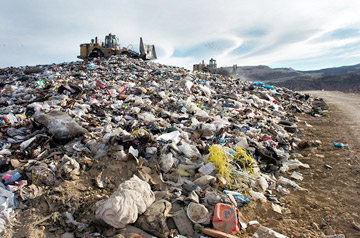Faulty laws
Urban plastic waste management rendered inefficient:
by Dhaneshi Yatawara
Inadequacies in the rules and regulations to categorise plasticware
has made the plastic recycling process of the country inefficient,
scientists complain. It has left the bulk of urban plastic waste which
continues to pollute the environment.
|
 |
|
Separating different types
of waste
Pic: eco-clean.co.uk |
According to experts there are no regulations in Sri Lanka to
instruct plasticware manufacturers to compulsorily indicate the resin
type used to make a particular plastic item according to the
internationally recognised code.
The issue was brought to the notice by experts in a special round
table discussion for media personnel, organised by the Centre for
Sustainability of the Department of Forestry and Environmental Science,
held recently at the University of Sri Jayewardenapura.
The discussion was an eye opening session for journalists reporting
in the specific fields from all media.
Dr. Jagath Manathunge, a specialist in biological and environmental
sciences of the University of Moratuwa, explained that plastics are made
out of different resins, and knowing the exact chemical structure is
important as the recycling processes are different. "Collecting
different types of plastic waste separately is a necessity for an
efficient plastic waste recycling process," he added.
"Many of the plastic products imported and manufactured locally do
not indicate the Resin Identification codes, which are internationally
accepted. Recycling plastic is impossible if the manufacturers do not
indicate this," explained Dr. Manathunge.
The Resin Identification codes or R.I. Codes indicate the type of
plastic depending on the different chemical polymers used to make the
plastic. The same recycling methods cannot be used for all of these
categories of plastics," explained Dr. Manathunge.
Eco-friendly product
For example, plastic water bottles have three types of plastics - the
cap, the bottle and the label are three different types. They need to be
disposed of separately and the manufacturers must indicate the three
codes.
If there is a mechanism to dispose of them separately by the
consumer, it would be more efficient than trying to separate it at the
recycling plant," he added further.
 |
|
Separating different types
of waste
Pic: eco-clean.co.uk |
Urban waste plastic recycling has numerous obstacles specially in a
country like Sri Lanka. Unlike the non labelling plastics with R.I.codes,
urban plastic waste is heavily contaminated and there are safety issues
at recycling plants. Plastic could be a more eco-friendly product, if
managed properly, said Dr. Manathunge.
"Considering the use of energy, waste of natural resources and
environmental pollution during manufacturing, plastic will have less
adverse effects on the environment if it is properly disposed, recycled
and reused," he elaborated.
"The problem is plastic is too versatile. We tend to use it for
mostly disposable, low value items such as food wraps and product
packaging. But plastic is not disposable," he added.
Considering the number of families in Sri Lanka, the total
consumption of plastic bags per day would be 1.9 billion - if assumed
each family discards one bag per day, according to the scientist. "Bags
is just one consumable, there are many other items used daily such as
yoghurt cups, lunch sheets, water bottles and tetra packs," he added.
All these compose a bulk of the urban waste, which is not efficiently
managed in any Sri Lankan town. Many programs were initiated under the
Central
Environment Authority's Post Consumer Plastic Recycling program. A
list of commercial recyclers are registered with the Central Environment
Authority (CEA) under the Post Consumer Plastic Recycling program.
"But the recyclers are very specific about the type of plastics they
take to be recycled," said Director, Waste Management Unit of the CEA.
Even though the discussion was meticulously organised facilitating
the journalists, the presence of the private sector and the recyclers
would have established a better dialogue among all stakeholders.
Highly politicised
The policies, studies and theories were heavily discussed at the
round table, but the practicality of the matter at the ground level was
very vague. Commenting on behalf of the organisers, President of the
Centre for Sustainability Dr. Priyan Perera said that their aim was to
make journalists aware of the current situation in urban plastic waste
management.
"We organised a series of discussions bringing all stakeholders
together - especially the private sector and the scientists.
The aim was to disseminate the scientific knowledge and the state of
the art technology to the company owners to bring a sustainable solution
to the problem," he explained.
The disparity between the local authorities and the main decision
making bodies coming under the Central Government was also recognised as
an obstacle in finding a sustainable solution to the urban plastic waste
problem.
The CEA has no authority to direct the local authorities, especially
the Municipal Councils and the Provincial Councils to conduct the
plastic waste management programs.
Despite the continuous monetary and technical support by the CEA,
plastic waste management programs are either discontinued or
inefficiently carried out by the local authorities due to the highly
politicised nature of the these institutes.
In order to bridge this gap, it was suggested at the discussion to
establish grassroot level organisations and educate decision makers of
political parties. |

